-
Genealogy & Names
-
Tourist Information
-
Culture & Reference
CHRISTMAS GIFTS FROM IRELAND - VISIT IrishNation.com Only 354 Days To Go! |
|
JULY 2024 
Fairy Fort Image from Free Photos Of Ireland |


FREE WORLDWIDE DELIVERY FOR A LIMITED TIME find out more |

| Popular Articles from Recent Newsletters: |

|
Hello again from Ireland! In this month's issue we remember the Irish Patriot and social activist Michael Davitt, who had such a long-lasting influence on the lives of the people of Ireland. From the world of Irish mythology we learn about Manannán Mac Lir and his cloak of invisibility. 'The Fairies' Revenge' is another mystic tale of old Ireland from Lady Wilde, while we also start off a series of articles about popular hikes and walks in Ireland. This time we visit Howth in Dublin and the fantastic (and free) cliff-walks. Enjoy!
You can help to keep this newsletter alive by gifting some
Family Crest Gifts
Jewellery or Crystal
to your family or friends at our online shop at
IrishNation.com.
If you have an article or story you would like to share then please do send it to us. Until next time, Michael 
P.S. Please Do Forward this Newsletter to a friend or relative. If you have a website or Facebook page or Blog (or whatever!) then you can help us out by putting a link on it to our website: www.ireland-information.com
|

|
Recent data from the Central Statistics Office of Ireland has incredibly revealed that residential property prices continue to climb unabated and increased by an unbelievable 8.2% in the 12 months to May 2024.  That is an 8.2% increase on top of the huge increases of recent years.
That is an 8.2% increase on top of the huge increases of recent years.
The Policies of several Governments over the last decade have abjectly failed to address the housing issue in the country, a point reinforced by the current administration's own 'Housing Commission' report that found that there have been repeated and systemic failures by risk-averse legislators resulting in the appalling situation now facing millions of Irish citizens. Yes, millions of Irish citizens are affected by this disaster, the big winners of which are the institutional property investors (ie, usually foreign and already wealthy). Despite this calamity the Irish electorate rewarded the parties of government (Fiánna Fail and Fine Gael) with relatively good results in the recent local and European elections. Clearly the vast majority of Irish citizens who vote (ie, usually older and already owning a property), are not at all unhappy with the current situation. You get what you vote for. And you deserve it. CSO Property Price Index Housing Commission Report DON'T MAKE UNNECERSSARY JOURNEYS AND DON'T SWIM IN THE SEA!!!! 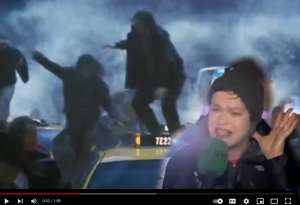
click for external video It is a sign of the times that Storm 'Desmond' that hit Ireland in 2015 is probably most remembered now for a sensational viral news report than it is for the damage caused. It is hard to imagine that Teresa Mannion who was conducting a TV report from a rain-battered Galway, ever thought that she would become an internet sensation and yet that is what occurred in 2015 when her report was picked up by TV stations around the world and became a hugely copied and parodied piece. 
click for external video That seemed to be that until the savvy promoters of the 2024 movie 'Twisters' released their own version of Teresa's famous words but lip-synced by stars of the movie, including Daisy Edgar-Jones and Anthony Ramos. Teresa Mannion. Legend! |

|
||||

|
Manannán Mac Lir - pronounced: 'man-an-awn mack leer' Tuatha Dé Danann - pronounced: 'two-hah day dan-inn' Manannán Mac Lir was the greatest sea-god of Irish Mythology. His name means 'son of the sea' and he is regarded as the Overlord of the mighty Tuatha Dé Danann. 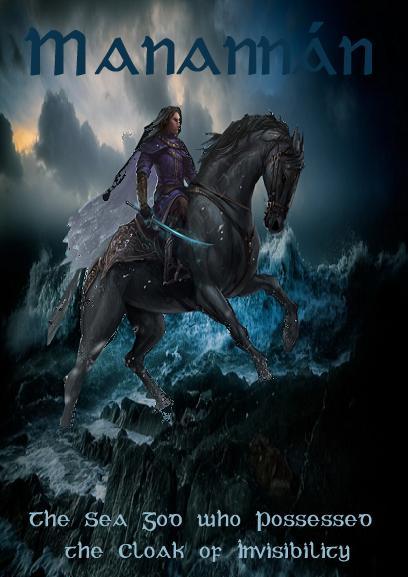
Such was the power of the chariot that it obeyed the thoughts of the person aboard and did not require sails or oars. The boat could even grow to accommodate any number of passengers. Manannán was associated with the Isle of Man, the small island in the Irish sea, and takes his first name from that place. He possessed the sword named 'Fragarach', meaning 'the Answerer' and the incredible 'Féth Fíada', the cloak of invisibility that he would use to protect the Isle of Man from being seen. Manannán Mac Lir was thus very formidable. Manannán was married to the fairy woman Fand, whose incredible beauty was known throughout the world and who had started life as a sea-bird. The mighty Irish warrior Cuchulainn took Fand for his own but Manannán retrieved her by placing his cloak between Fand and Cuchulainn, thus magically erasing their memory of each other. This was an incredibly merciful act! Fand returned to her husband and together they traveled through Ireland. Cuchulainn returned to his wife Eimear, the pair also drinking of the cup of forgetfulness, provided by the Druids. One of the most famous stories associated with Manannán is that of the 'Voyage of Bran Mac Febal'. The High King Bran, the son of Febal, who left Ireland behind to explore the Islands of the Otherworld had an original mind and great drive. One day, while out walking near Tara, King Bran heard beautiful music, but he could not figure out where it was coming from. No matter which way he turned, it always seemed to be coming from just behind him. Lulled by the lovely sound, he fell asleep and dreamed of a beautiful woman, holding a sliver branch and singing to him of a perfect place, an Island of Women, where there was no death, or war or conflict, and where she was Queen. When he woke, he found the silver branch in his hand, and brought it with him to Tara. That evening, at the feast, the fairy woman appeared again, this time in front of the whole company. She retrieved her silver branch, and asked Bran to sail across the sea to find her. Bran set out at once, accompanied by his three foster-brothers, who brought nine men each with them. When their ship was underway, Bran met Manannán Mac Lir, riding on his white horse, on his way to Ireland. Manannán spoke to Bran of another way of perceiving, and told him that the waves Bran saw were grassy plains to Manannán's eyes, with chariots racing to and fro over them. Along with this other way of seeing, Manannán gave Bran back the silver branch, as a token of his new perception. Bran and his men came first to the Island of Joy, where the people all laughed without speaking. One of Bran's men went to investigate, but lost his wits as soon as he set foot on the island, succumbing to mindless laughter with all the others. After this experience, they were wary when they reached the Island of Women, but the Queen threw a magic ball of yarn to Bran, which stuck to his hand when he caught it, forcing them to land. Bran and his men lived in bliss and ease on the Island of Women for an unknown time, but one man, Neachtain, was homesick, and begged to go back to Ireland. Eventually, Bran agreed. The Queen gave him directions back to Ireland, and gave him the magic ball of yarn so he could retrieve his man from the Island of Joy. But when at last Bran and his men came back to Ireland, they found the coastline changed, forests gone, and all the people small and grey. Calling to shore, they found that no one knew who they were, save one very old storyteller, who remembered an ancient king called Bran. Neachtain, overcome by homesickness, leapt from the ship to the shore, but turned to dust as soon as he landed. Realizing they could never go home, Bran wrote down an account of his adventures on stone tablets and tossed them to the people on the shore, and then he turned his ship around and sailed back to the islands of the Otherworld. Bran may have yet regretted sailing for the Island of Women, as well as the new 'silver branch' perception that Manannán Mac Lir had given him. The legends of Manannán Mac Lir have thus survied the centuries. He is recorded in the ancient 15th century manuscript 'The Book of Fermoy' thus: 'He was a Pagan, a lawgiver among the Tuatha Dé Danann, and a Necromancer possessed of power to envelope himself and others in a mist, so that they could not be seen by their enemies.' Manannán Mac Lir - the mighty Sea-God of Ancient Ireland!  Read more amazing Stories of Irish Legends and Mythology. |


find out more |


|
There is no need to say any more about the benefits of hiking, hill-walking, rambling, mountain climbing and just bog-standard moving. The fact is that the more you move the better you feel and the longer you are likely to last. So with that in mind this series of articles will be detailing some east and not-so easy hikes in Ireland, starting with this one in Howth that is accessible via public transport, and others that you may need a car to get to. 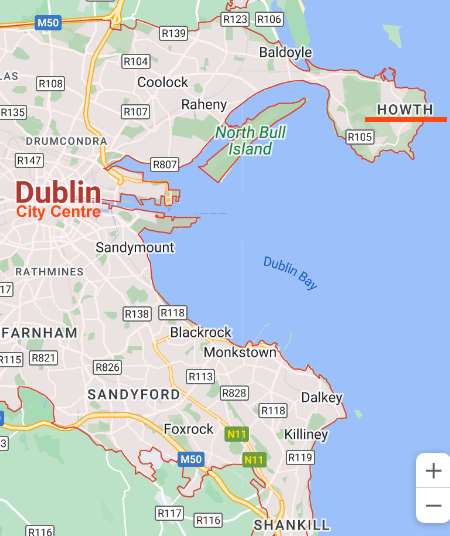
So let us begin in Howth which is located at the end of a spur off the widely used DART rail service. You can get to Howth in under an hour from O'Connell Street via the DART and enjoy a cracking walk and visit to this popular fishing town which is located on a peninsula jutting out of the northern part of the city. It is a great little town with several popular walks, great sea-food and restaurants and, like pretty much all of Ireland, is transformed when the sun shines. When you exit the DART station at Howth there is a small tourist office a short distance across the road where you should be able to get a copy of the local walking maps. If it is closed then there are usually notice-boards with the maps that you can photo. The most popular walk brings you up to the cliffs (at the far end of the town, away from the DART station) and up towards some pretty spectacular views. If you are lucky enough to have the sun-shining (it really is worth keeping a close eye on weather forecasts when planning your hike), then you may yet feel that you are on a Mediterranean island, rather than the Atlantic-battered rock that is Ireland.  There are a number of different routes and circuits you can take, but by far the most popular is the main cliff walk (red route) that offers fantastic views and will allow you to loop back along the upper route (that runs parallel to the cliff walk below), and also leads you to the Baily Lighthouse at the top of the loop (before heading back towards the town).
There are a number of different routes and circuits you can take, but by far the most popular is the main cliff walk (red route) that offers fantastic views and will allow you to loop back along the upper route (that runs parallel to the cliff walk below), and also leads you to the Baily Lighthouse at the top of the loop (before heading back towards the town).
Alternatively you can just retrace your steps along the lower cliff walk, back the way you came. Fish and Chips await! A visit to Howth is a super an inexpensive day out when you are visiting Dublin. It is well worth the effort and gets you out of the city centre for a few hours. Make sure you learn how to use the 'LEAP' card (external video) when using Dublin public transport and you are all set up. 
|


find out more |


View the Archive of Irish Phrases here: http://www.ireland-information.com/irishphrases.htm |

|
The winner was: sombradavis@yahoo.com who will receive the following: A Single Family Crest Parchment (usually US$29.99) Send us an email to claim your Parchment, and well done! Remember that all subscribers to this newsletter are automatically entered into the competition every time. I hope that you have enjoyed this issue! 
by Michael Green, Editor, The Information about Ireland Site. https://www.ireland-information.com Contact us (C) Copyright - The Information about Ireland Site, 2024. 17 Páirc Ghrainbhil, Carraig Dubh, Contae Baile Átha Cliath, Ireland Tel: 353 1 2893860 |

|
MARVELOUS GIFTS FOR ANY OCCASION FREE DELIVERY TO YOUR DOOR 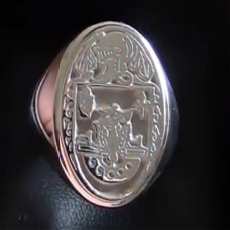
BIG REDUCTIONS! Stunning Family Crest Signet and Seal Rings 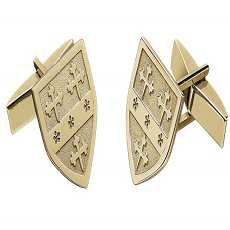
DISCOUNTED FOR A LIMITED TIME Elegant Cufflinks 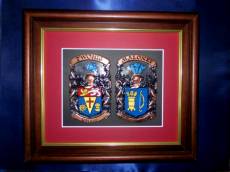
Incredible Family Crest Plaques Made in Ireland 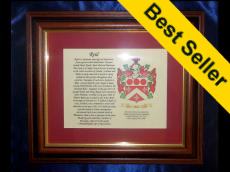
Superior Framed Family Crest Parchments 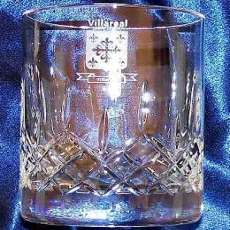
Gorgeous Glistening Galway Crystal 'Your-Name' Old Irish Sign NEW DESIGNS! 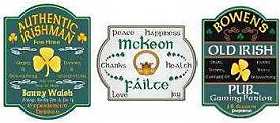
From US$34.99 - Free Delivery 
New Designs available on our Coffee Mugs 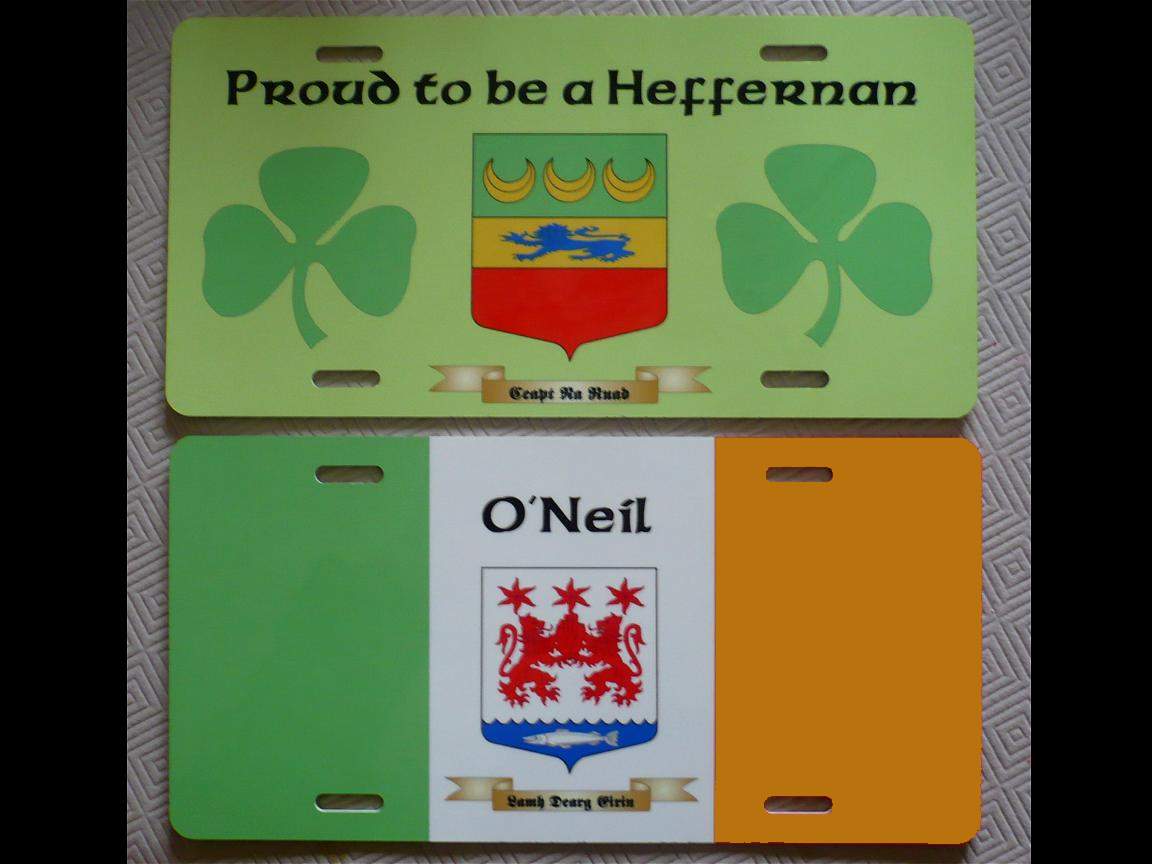
Personalized Licence Plate 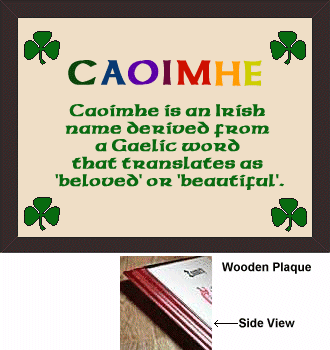
Personalized First Name Plaque. Great for Kids! 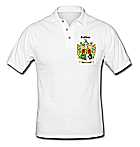
'Your-Name' Polo & Tee Shirts 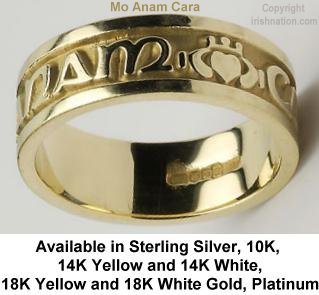
From US$69 Delivered BIG REDUCTIONS! Stunning Engraved Rings from Ireland with Irish Language Phrases. Mo Anam Cara: My Soul Mate Gra Dilseacht Cairdeas: Love, Loyalty, Friendship Gra Go Deo: Love Forever Gra Geal Mo Chroi: Bright Love of my Heart SEE MORE GREAT OFFERS AND DISCOUNTS AT: IRISHNATION.COM FREE DELIVERY FOR A LIMITED TIME! |
